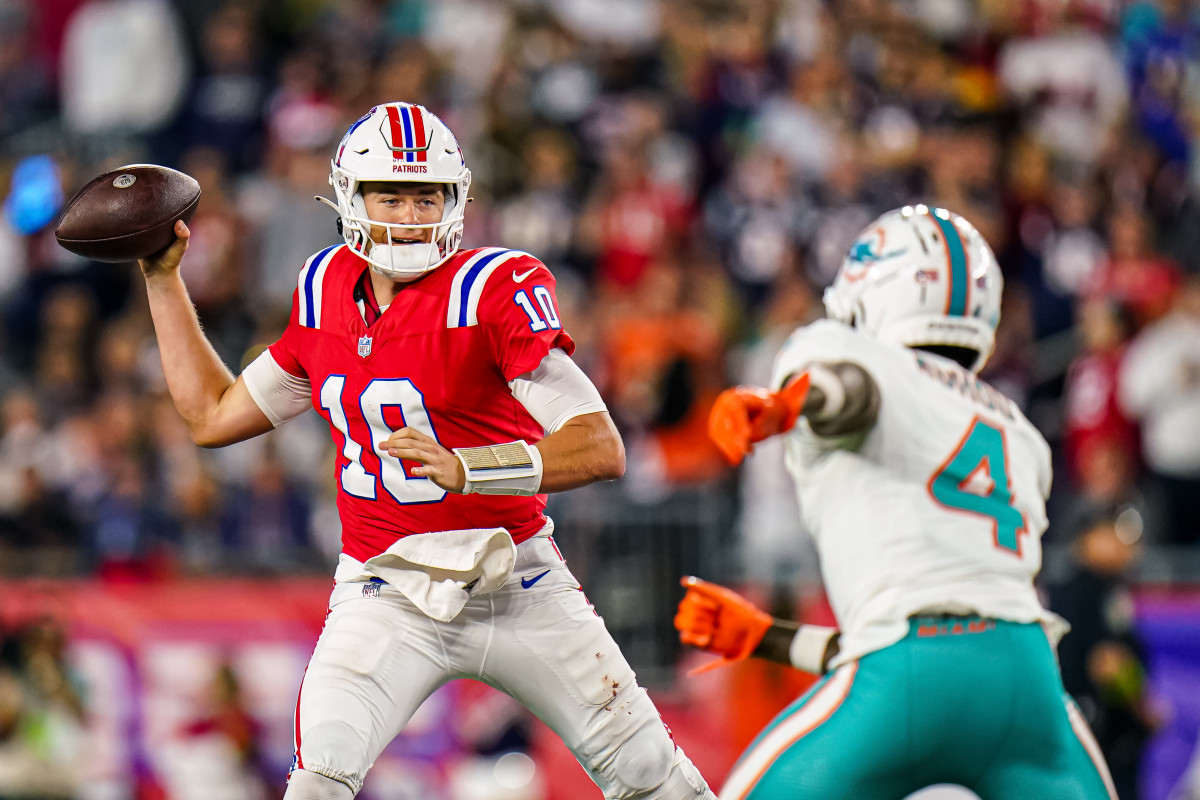Sidetracked Mac? Patriots Need QB Leadership
FOXBORO — Once again, the New England Patriots "missed it by that much."
The Pats suffered a 24-17 loss to the Miami Dolphins in their Week 2 matchup on Sunday night at Gillette Stadium; falling to 0-2 on the season — their first such start since the 2001 campaign.
After coming within a toe tap of extending a potential game-winning drive against the Philadelphia Eagles in Week 1, quarterback Mac Jones and the Patriots once again found themselves unable to gain the necessary ground on the field to extend their efforts to earn the come-from-behind victory.
"It just wasn't our day," Jones told reporters following Sunday night's loss. "It hasn't been our day for the last two weeks. So, we’ve just got to learn from it and get better."
While missed opportunities and early deficits continue to plague the team in their efforts to enter the win column, Jones' performance remains one of the most polarizing topics among fans and media, alike. He finished the game having completed 31 of 42 passes for 231 yards with one touchdown and one interception. Though the aforementioned totals may typically be considered an adequate stat line, Jones' handful of ill-timed throws and apparent inability to make the necessary plays in the clutch have some wondering whether he should receive the largest slice of "blame pie' for New England's Week 2 loss.
Though the incurable optimists claim that Jones has only been a victim of circumstance, the snarky side of "Pats Nation Boulevard" will happily push the agenda that the Patriots' third-year signal caller is simply incapable of completing a comeback.
In paraphrasing Aristotle, virtue is likely to lie somewhere in the middle.
Even the staunchest Jones supporter is probably willing to concede that his third-quarter pass intercepted by Miami cornerback Xavien Howard was both a poor and costly decision. With the Pats mere inches from entering the red zone, the 25-year-old's throw looked a bit forced as he attempted to find receiver — and ex-Dolphin — DeVante Parker, who was well-covered by Howard, his former Miami teammate. Given the timing of Jones' pick, the Dolphins were able to carry their 17-3 lead into the fourth quarter.
Additionally, the Patriots seemed poised to extend their final drive into the game's closing minute. On fourth-and-4 from the Dolphins 33-yard line, Jones completed a pass to tight end Mike Gesicki which fell short of the first down marker. Gesicki showed impressive field savvy by flipping the ball to back to left guard Cole Strange, who lunged forward, yet ultimately fell short of the first down. Despite the best efforts of both Gesicki and Strange, Jones' detractors have lamented the Alabama product's perceived inability to earn the four yards necessary for a fresh set of downs. As such, Jones' ball placement in crunch time is being called into question for the second straight week.

Still, the blame cannot be laid at Jones' feet in good conscience without acknowledging the makeshift nature of the offensive line behind which he has been playing for the past two weeks. While both Strange and Michael Onwenu returned to their familiar spots along the offensive line on Sunday night, the Pats unit still looked like a group continuing to find its identity. In addition to Strange (left guard) and Onwenu (right guard,) New England started newcomer Vederian Lowe at left tackle (in place of the injured Trent Brown) with captain David Andrews at center and Calvin Anderson (who recently returned from a lengthy stay on the non-football illness list) at right tackle.
In contrast to New England's struggles, the Dolphins defensive front often got the better of their counterparts, with B-Gap blitzes from defenders such as David Long, Bradley Chubb and Andrew Van Ginkel. Despite playing without injured outside linebacker Jaelan Phillips, Miami's defense finished the night with four sacks and eight quarterback hits. Anderson was credited with allowing a sack on Jones, while surrendering three quarterback hits. Strange, Lowe and reserve guard Atonio Mafi were each charged with allowing sacks, while center David Andrews and running back Ezekiel Elliott allowed a hit on Jones. In each of the instances in which Miami's pass rush reached Jones, the Pats quarterback had less than 2.5 seconds to react. As such, New England's offense, led by Jones, had a miniscule amount of time to either effectively use the running game or test the Dolphins secondary deep. It also placed a great deal of pressure — both literally and figuratively — on New England's third-year starter.
In fact, Jones acknowledged the impact of pressure on the Pats offensive game plan in the aftermath of Sunday's loss.
"You got three new guys on the line. Those guys came in, played really hard," Jones said. "But, [Miami has] a tough front to go against. Coach [Bill] O'Brien, obviously, wanted to throw it downfield, but you got to kind of take what the defense gives you. It was a tough, tough day on the yard. But I definitely want to find ways to get it down the field more to help our defense."
In the final analysis, assigning blame to Jones, or any individual entity, is irresponsible in this case. Both Jones and his teammates must improve their performance, should they hope to salvage their season. While 0-2 is not an insurmountable hole from which to climb, the Patriots' margin for error is thinning with each passing day. As the team returns to the practice fields this week, in preparation for their Week 3 matchup with the New York Jets on Sunday at MetLife Stadium, Jones will be called upon to set the example. To do so, the Pats captain must work in unison with New England's offensive line, as well as their skill position players to execute their game plan when needed most. Having completed an estimated 72 percent of his passes under pressure and against the blitz on Sunday night, Jones is demonstrating growth from last season.
In short, he already is leading by example ... but more is needed in the game's biggest moments.
The talent to win is there — as evidenced by the balanced efficiency both Jones and the Pats have shown in their five scoring drives this season. In just two games under the tutelage of Bill O'Brien, he ranks within the top 10 NFL quarterbacks in passing yards and touchdown passes, while topping the list in both completions and attempts. Still. Jones must see himself as neither the hero, nor the scapegoat. Instead, he must inspire his team by proving that "the moment" is within his control. While his willingness to accept accountability has been admirable, New England's more pressing need is for leadership. In that vein, it is a safe bet that Jones and the Pats will be squarely focused on improving their collective present, rather than assigning blame for their past.
Their season, after all, just may depend on it.
